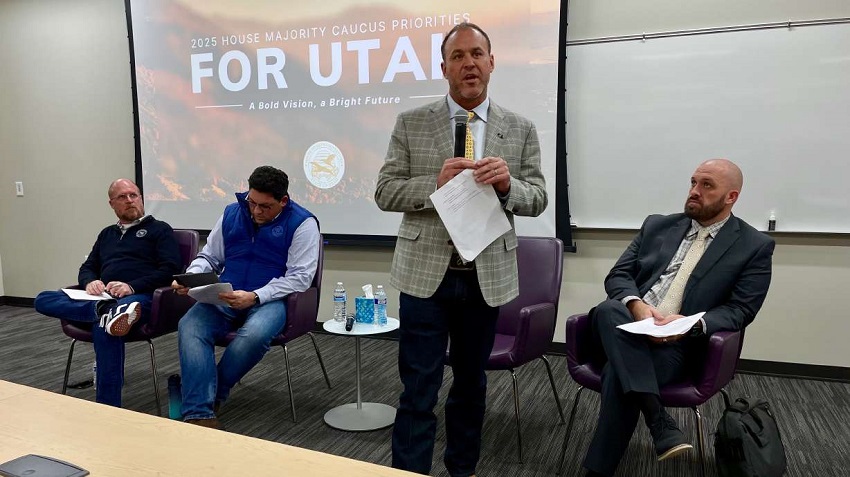OGDEN, UT — Utah Republicans are gearing up to push for greater state control and less federal oversight in the 2025 legislative session, which begins next week. House Speaker Mike Schultz, speaking at a town hall gathering at Weber State University in Ogden, highlighted the party’s desire to collaborate with the newly created Department of Government Efficiency (DOGE) to reduce federal bureaucracy and keep more state revenue within Utah.
Schultz, a Republican from Hooper, expressed hope that working with the Trump administration’s DOGE, which is led by figures like Elon Musk and Vivek Ramaswamy, could help Utah retain more of its own tax dollars. The initiative would focus on areas like road funding, where federal money currently flows through Washington, D.C., before being allocated back to the state. Schultz emphasized that the aim is to avoid federal “strings” attached to that funding.
“We just don’t want your strings attached,” Schultz said. “Let us keep our transportation dollars.”
The focus on transportation is just the beginning, according to Schultz. Education could also become a target for state-level reforms if this collaboration proves successful. U.S. Rep. Blake Moore, who represents Utah’s 1st District, is playing a key role in the effort, helping lead the Delivering Outstanding Government Efficiency Caucus, which will work with DOGE to pursue these goals.
Schultz noted that Moore is “excited” about the plans, and although specifics are still being developed, the overall aim is to reduce federal involvement in state projects and keep more funds within Utah’s borders. This push is seen as a way to both save the federal government money and allow Utah to manage its own projects more efficiently.
The 2025 session will also tackle a range of other issues. Schultz revealed that approximately $165 million has been earmarked for tax cuts, with a focus likely on reducing income or Social Security taxes. Utah Republicans have already cut income taxes by nearly 10% over the past four years, and they are committed to further reductions, Schultz said.
Energy policy is another major point of discussion. Schultz stressed the importance of nuclear energy as part of the state’s strategy to meet growing energy needs. While Utah relies on solar, coal, and natural gas, the speaker believes that increasing the focus on nuclear energy will help prevent power shortages, particularly as the state continues to grow.
“We’re going to make a big push to start developing more nuclear. We think that’s something that there’s a lot of opportunity in,” Schultz stated, pointing to the potential for avoiding power outages like those seen in other states.
Public safety also remains a top priority, with legislation to address the fentanyl crisis in Utah. Rep. Matt Gwynn, the Roy police chief and a key figure in the state’s law enforcement efforts, announced plans to introduce a bill targeting fentanyl trafficking. Under the proposed legislation, individuals caught with 100 grams of fentanyl—enough for about 1,000 doses—would face first-degree felony charges and mandatory prison time. Gwynn emphasized the unique danger posed by fentanyl, calling it a public health crisis that requires a tougher legal response.
“Fentanyl is not like any other illicit drug,” Gwynn said. “We shouldn’t treat it like we treat the other drugs in the state of Utah.”
With the legislative session set to begin on January 27, 2025, Utah Republicans are preparing to focus on state autonomy, economic growth, and public safety. The proposed reforms signal a clear intention to push back against federal involvement in state affairs while addressing critical local issues, from road funding to the growing fentanyl epidemic.

